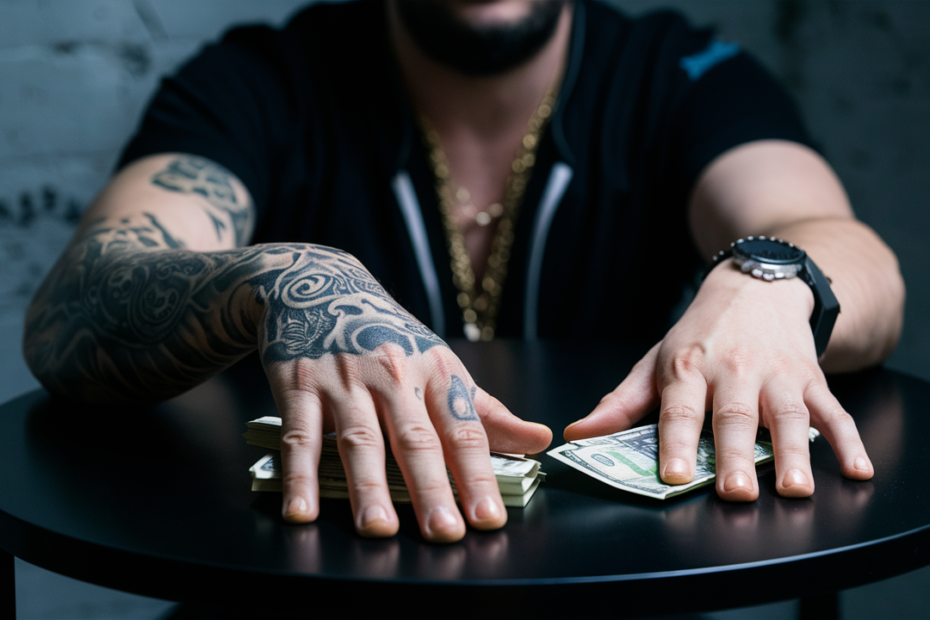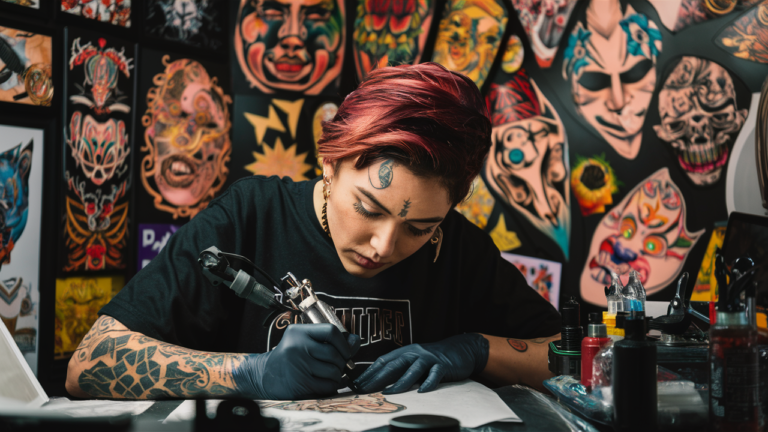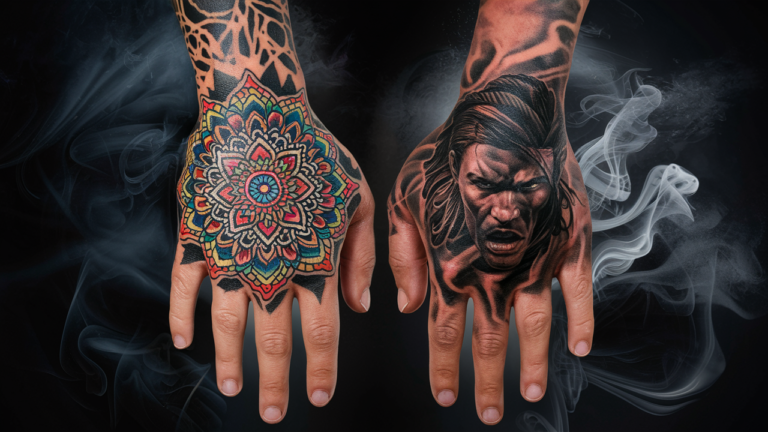Getting a tattoo is an exciting journey of self-expression, but one of the first questions that come to mind is, “How much does a tattoo cost?” Understanding the factors that influence tattoo pricing can help you plan and budget effectively for your next piece of body art. Let’s dive into the details to give you a clear picture of what to expect.
Factors Influencing Tattoo Cost
Size of the Tattoo
The size of your tattoo is one of the most significant factors affecting its cost. Smaller tattoos typically cost less than larger, more intricate pieces. A small tattoo might be completed in a single session, while larger tattoos can require multiple sessions and more hours of work.
Complexity and Detail of the Design
Intricate designs with a lot of detail and shading require more time and skill to complete, which can increase the cost. Simple line drawings or minimalistic designs are usually quicker and less expensive.
Location on the Body
Certain areas of the body can be more challenging to tattoo due to their curvature, sensitivity, or accessibility. Areas like the ribs, hands, and feet might cost more due to the additional skill and time required.
Artist’s Experience and Reputation
A highly experienced and well-known artist will typically charge more for their services. Their expertise, consistency, and unique style can justify the higher price. On the other hand, newer artists or those just starting may offer lower rates to build their portfolio.
Geographic Location
Tattoo prices can vary significantly based on the geographic location of the studio. Cities with a high cost of living or a dense population of skilled artists might have higher rates compared to smaller towns or rural areas.
Average Tattoo Prices
Small Tattoos
Small tattoos, like a tiny heart or a simple symbol, typically cost between $50 and $200. These are often quick sessions that can be completed in under an hour.
Medium Tattoos
Medium-sized tattoos, such as a detailed forearm piece or a small back design, usually range from $200 to $500. These may require a few hours to complete.
Large Tattoos
Large tattoos, including half sleeves, full sleeves, or substantial back pieces, can range from $500 to $2000 or more. These intricate designs often require multiple sessions.
Full Sleeve and Larger Pieces
Full sleeve tattoos and extensive body art projects can easily exceed $2000, depending on the complexity and hours involved. These are significant commitments in both time and money.
Tattoo Pricing Models
Hourly Rates
Many tattoo artists charge by the hour, especially for larger or more detailed work. Hourly rates can range from $100 to $300 or more, depending on the artist’s skill and location.
Flat Rates
For smaller or simpler tattoos, some artists offer a flat rate. This can be a more straightforward pricing model for designs that can be completed in a single session.
Additional Costs to Consider
Touch-ups
Over time, tattoos can fade or require minor adjustments. Some artists include touch-ups in the initial price, while others may charge separately.
Aftercare Products
Proper aftercare is crucial for the healing process and longevity of your tattoo. Budget for aftercare products like ointments, lotions, and gentle soaps.
Tips for the Artist
Tipping is customary in the tattoo industry, typically ranging from 15% to 20% of the total cost. This is a way to show appreciation for the artist’s work and dedication.
Budgeting for a Tattoo
Saving for Your Tattoo
Set aside money over time to ensure you can afford the tattoo you want. This will help avoid financial stress and ensure you can get the quality you desire.
Getting Quotes from Artists
Consult with several artists to get quotes and understand their pricing structures. This can help you find the best fit for your budget and artistic vision.
Planning for Additional Costs
Remember to budget for touch-ups, aftercare products, and tips. Having a comprehensive financial plan will make the process smoother.
Cheap vs. Expensive Tattoos
Risks of Cheap Tattoos
While it might be tempting to go for a cheaper option, low-cost tattoos often come with risks. Poor quality ink, lack of hygiene, and inexperienced artists can lead to subpar results and health issues.
Benefits of Investing in a Quality Tattoo
Paying more for a skilled and reputable artist ensures a high-quality, long-lasting tattoo. The investment in artistry and professionalism can prevent future regrets and additional costs for corrections.
Common Tattoo Cost Myths
“More Expensive Means Better”
While cost often correlates with quality, it’s not the only factor. Research and reviews are essential to ensure you’re paying for skill and not just a high price tag.
“All Artists Charge the Same”
Tattoo artists set their rates based on experience, location, and demand. Prices can vary widely, so it’s important to shop around and find an artist whose work and rates align with your expectations.
“Tattoos are a One-Time Cost”
Tattoos require ongoing care and potential touch-ups. Considering these future costs in your budget is important to maintain the appearance of your tattoo.
How to Get the Best Value for Your Money
Researching Artists
Spend time researching artists, looking at their portfolios, and reading reviews. A well-researched decision can lead to better results and satisfaction.
Reading Reviews
Client reviews can provide insights into an artist’s professionalism, cleanliness, and quality of work. Look for consistent positive feedback.
Viewing Portfolios
A portfolio showcases an artist’s style, skill, and range. Make sure their work aligns with your vision for your tattoo.
Scheduling Consultations
Meeting with the artist beforehand can help you gauge their professionalism, discuss your design, and get an accurate quote.
Conclusion
Recap of Key Points
Understanding the cost of a tattoo involves considering various factors like size, complexity, artist experience, and geographic location. By researching and budgeting carefully, you can ensure a high-quality tattoo that you will cherish for years to come.
Final Thoughts on Tattoo Costs
Investing in a tattoo is not just about the financial cost but also about the value it brings to your self-expression and personal story. Take your time to find the right artist and design, and the result will be a beautiful piece of art you can wear proudly.
FAQs
- How much should I tip my tattoo artist? It’s customary to tip your tattoo artist between 15% to 20% of the total cost, depending on your satisfaction with the work.
- Are touch-ups usually included in the initial price? Some artists include touch-ups in the initial price, but it’s best to clarify this beforehand with your artist.
- Can I negotiate the price with my tattoo artist? While some artists may be open to negotiation, it’s important to respect their pricing and the value of their work.
- How do I know if I’m being charged fairly? Researching average prices in your area and consulting multiple artists can help you determine if you’re being charged fairly.
- What should I do if I’m not happy with the price quoted? If you’re not satisfied with a quote, consider discussing your budget with the artist or looking for another artist who better fits your financial plan.




Pingback: How Do I Choose a Tattoo Design? - Ink Lovers
Pingback: How Do I Find a Good Tattoo Artist? - Ink Lovers